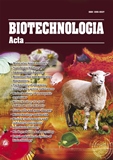ISSN 2410-7751 (Print)
ISSN 2410-776X (Online)

Biotechnologia Acta Т. 17, No. 2 , 2024
P. 59-61, Bibliography 5, Engl.
UDC::616.36-004+340+612.017.1
DOI:https://doi.org/10.15407/biotech17.02.059
DONOR-SPECIFIC ANTIBODIES AS A PREDICTOR OF GRAFT REJECTION AFTER LIVER TRANSPLANTATION
A.V. Kukhol, N.A. Tsokolenko, A.O. Mazanova, Y.A. Hrohul
National Specialized Children's Hospital “OHMATDYT” of the Ministry of Health of Ukraine, Kyiv
The main reason for graft loss is the rejection of the donor organ, which may occur at different time after transplantation and may be caused by the recipient’s organism reaction against donor’s human leukocyte antigen (HLA) proteins. Donor-specific antibodies (DSA) are produced in patient’s organism as a response to foreign HLA antigens.
Aim. The purpose of our study was to evaluate the effects of already existed and/or de novo generated DSAs in liver transplantation as predictors of graft rejection and to establish an interconnection between blood biochemical parameters (Alanine aminotransferase (ALT), aspartate aminotransferase (AST), total bilirubin level) with the level of DSA in patients with liver transplant.
Methods. xMAP-Luminex next generation flow cytometry technology and LABScreen Single antigen beads reagent (Onelambda, USA) were used for antiHLA determination. Total bilirubin level was detected photometrically. The activity of ALT and AST was determined spectrophotometrically on the automatic analyzer COBAS C 111 (Roche, Switzerland) in accordance with the manufacture’s instruction.
Results. Detection of DSA and PRA was important at the same level as measurement of classical biochemical parameters of liver function (ALT, AST etc.) for monitoring of graft status and prevention of acute or chronical rejection and choosing correct immunosuppression protocol.
Conclusions. The DSA and PRA levels as well as total bilirubin and ALT and AST activity corresponded to each other and could be used for comprehensive both pre- and post-transplantation screening of patients requiring liver transplantation or re-transplantation. Detection of DSA and PRA was important at the same level as measurement of classical biochemical parameters of liver function (ALT, AST etc.) for monitoring of graft status and prevention of acute or chronical rejection and choosing correct immunosuppression protocol.
Key words: HLA antibodies, donor-specific antibodies, transplantation screening.
REFERENCES
1. Chauhan R, Tiwari A.K., Aggarwal G., Gowri Suresh L., Kumar M., Bansal S.B. Low-MFI (median
fluorescence intensity) pre-transplant DSA (donor specific antibodies) leading to anamnestic
antibody mediated rejection in live-related donor kidney transplantation. Transplant Immunology.
2023, v. 81:101931. https://doi.org/10.1016/j.trim.2023.101931.
2. Legaz I., Boix F., López M., Alfaro R., Galián J.A., Llorente S., Campillo J.A., Botella C., Ramírez
P., Sánchez-Bueno F., Pons J.A., Moya-Quiles M.R., Minguela А., Muro M. Influence of Preformed
Antibodies in Liver Transplantation. J. Clin. Med. 2020, 9, 708. https://doi.org/10.3390/
jcm9030708.
3. Baudry G., Pozzi M., Aubry M., Hugon-Vallet E., Mocan R., Chalabreysse L., Portran P., Obadia J.F.,
Thaunat O., Girerd N., Dubois V., Sebbag L. De Novo Complement-Binding Anti-HLA Antibodies in
Heart Transplanted Patients Is Associated with Severe Cardiac Allograft Vasculopathy and Poor
Long-Term Survival. J. Clin. Med. 2022, 11: 3731. https://doi.org/10.3390/jcm11133731.
4. Beyzaei Z, Geramizadeh B, Bagheri Z, Karimzadeh S and Shojazadeh A (2020) De Novo Donor
Specific Antibody and Long-Term Outcome After Liver Transplantation: A Systematic Review and
Meta-Analysis. Front. Immunol. 11:613128. https://doi.org/10.3389/fimmu.2020.613128.
5. Kupcova Skalnikova H., Vodickova Kepkova K., Vodicka P. Luminex xMAP Assay to Quantify
Cytokines in Cancer Patient Serum. Methods Mol Biol. 2020: 65–88. https://doi.org/10.1007/978-
1-0716-0247-8_6.
© Palladin Institute of Biochemistry of National Academy of Sciences of Ukraine, 2024

